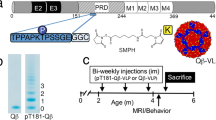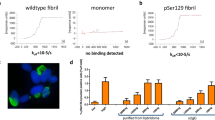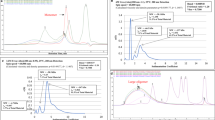Abstract
Prion diseases such as Creutzfeldt–Jakob disease (CJD) are fatal, neuro-degenerative disorders with no known therapy. A proportion of the UK population has been exposed to a bovine spongiform encephalopathy-like prion strain1,2,3 and are at risk of developing variant CJD4. A hallmark of prion disease is the transformation of normal cellular prion protein (PrPC) into an infectious disease-associated isoform5, PrPSc. Recent in vitro studies indicate that anti-PrP monoclonal antibodies with little or no affinity for PrPSc can prevent the incorporation of PrPC into propagating prions6,7. We therefore investigated in a murine scrapie model whether anti-PrP monoclonal antibodies show similar inhibitory effects on prion replication in vivo. We found that peripheral PrPSc levels and prion infectivity were markedly reduced, even when the antibodies were first administered at the point of near maximal accumulation of PrPSc in the spleen. Furthermore, animals in which the treatment was continued remained healthy for over 300 days after equivalent untreated animals had succumbed to the disease. These findings indicate that immunotherapeutic strategies for human prion diseases are worth pursuing.
This is a preview of subscription content, access via your institution
Access options
Subscribe to this journal
Receive 51 print issues and online access
$199.00 per year
only $3.90 per issue
Buy this article
- Purchase on Springer Link
- Instant access to full article PDF
Prices may be subject to local taxes which are calculated during checkout



Similar content being viewed by others
References
Collinge, J., Sidle, K. C., Meads, J., Ironside, J. & Hill, A. F. Molecular analysis of prion strain variation and the aetiology of ‘new variant’ CJD. Nature 383, 685–690 (1996)
Bruce, M. E. et al. Transmissions to mice indicate that ‘new variant’ CJD is caused by the BSE agent. Nature 389, 498–501 (1997)
Hill, A. F. et al. The same prion strain causes vCJD and BSE. Nature 389, 448–450 (1997)
Will, R. G. et al. A new variant of Creutzfeldt-Jakob disease in the UK. Lancet 347, 921–925 (1996)
Prusiner, S. B. Prions. Proc. Natl Acad. Sci. USA 95, 13363–13383 (1998)
Enari, M., Flechsig, E. & Weissmann, C. Scrapie prion protein accumulation by scrapie-infected neuroblastoma cells abrogated by exposure to a prion protein antibody. Proc. Natl. Acad. Sci. USA 98, 9295–9299 (2001)
Peretz, D. et al. Antibodies inhibit prion propagation and clear cell cultures of prion infectivity. Nature 412, 739–743 (2001)
Jackson, G. S. et al. Reversible conversion of monomeric human prion protein between native and fibrilogenic conformations. Science 283, 1935–1937 (1999)
Jackson, G. S. et al. Multiple folding pathways for heterologously expressed human prion protein. Biochim. Biophys. Acta 1431, 1–13 (1999)
Bueler, H. et al. Normal development and behaviour of mice lacking the neuronal cell-surface PrP protein. Nature 356, 577–582 (1992)
Beringue, V. et al. Regional heterogeneity of cellular prion protein isoforms in the brain. Brain (submitted).
Beringue, V. et al. Opposite effects of dextran sulfate 500, the polyene antibiotic MS-8209, and Congo red on accumulation of the protease-resistant isoform of PrP in the spleens of mice inoculated intraperitoneally with the scrapie agent. J. Virol. 74, 5432–5440 (2000)
Souan, L. et al. Modulation of proteinase-K resistant prion protein by prion peptide immunisation. Eur. J. Immunol. 31, 2338–2346 (2001)
Heppner, F. L. et al. Prevention of scrapie pathogenesis by transgenic expression of anti-prion protein antibodies. Science 294, 178–182 (2001)
Westaway, D. & Carlson, G. A. Mammalian prion proteins: enigma, variation and vaccination. Trends Biochem. Sci. 27, 301–307 (2002)
Klein, M. A. et al. PrP expression in B lymphocytes is not required for prion neuroinvasion. Nature Med. 4, 1429–1433 (1998)
Montrasio, F. et al. Impaired prion replication in spleens of mice lacking functional follicular dendritic cells. Science 288, 1257–1259 (2000)
Brown, K. L. et al. Scrapie replication in lymphoid tissues depends on prion protein-expressing follicular dendritic cells. Nature Med. 5, 1308–1312 (1999)
McKenzie, D., Kaczkowski, J., Marsh, R. & Aiken, J. Amphotericin B delays both scrapie agent replication and PrP-res accumulation early in infection. J. Virol. 68, 7534–7536 (1994)
Ingrosso, L., Ladogana, A. & Pocchiari, M. Congo red prolongs the incubation period in scrapie-infected hamsters. J. Virol. 69, 506–508 (1995)
Farquhar, C., Dickinson, A. & Bruce, M. Prophylactic potential of pentosan polysulphate in transmissible spongiform encephalopathies. Lancet 353, 117 (1999)
Brown, P. Drug therapy in human and experimental transmissible spongiform encephalopathy. Neurology 58, 1720–1725 (2002)
Sethi, S., Lipford, G., Wagner, H. & Kretzschmar, H. Postexposure prophylaxis against prion disease with a stimulator of innate immunity. Lancet 360, 229–230 (2002)
Sigurdsson, E. M. et al. Immunisation delays the onset of prion disease in mice. Am. J. Pathol. 161, 13–17 (2002)
Bard, F. et al. Peripherally administered antibodies against amyloid β-peptide enter the central nervous system and reduce pathology in a mouse model of Alzheimer disease. Nature Med. 6, 916–919 (2000)
Brandner, S. et al. Normal host prion protein necessary for scrapie-induced neurotoxicity. Nature 379, 339–343 (1996)
Anstee, D. J. et al. New monoclonal antibodies in CD44 and CD58: their use to quantify CD44 and CD58 on normal human erythrocytes and to compare the distribution of CD44 and CD58 in human tissues. Immunology 74, 197–205 (1991)
Avent, N. D. et al. Protein-sequence studies on Rh-related polypeptides suggest the presence of at least two groups of proteins which associate in the human red-cell membrane. Biochem. J. 256, 1043–1046 (1988)
Dickinson, A. G., Meikle, V. M. & Fraser, H. Identification of a gene which controls the incubation period of some strains of scrapie agent in mice. J. Comp. Pathol. 78, 293–299 (1968)
Wadsworth, J. D. et al. Tissue distribution of protease resistant prion protein in variant Creutzfeldt-Jakob disease using a highly sensitive immunoblotting assay. Lancet 358, 171–180 (2001)
Acknowledgements
This work is supported by grants from the Medical Research Council (UK). We thank D. Walsh and S. Gentleman for help with the immunohistochemistry.
Author information
Authors and Affiliations
Corresponding author
Ethics declarations
Competing interests
S.H., J.C. and D.A. are consultants to and founder shareholders in D-Gen Ltd.
Rights and permissions
About this article
Cite this article
White, A., Enever, P., Tayebi, M. et al. Monoclonal antibodies inhibit prion replication and delay the development of prion disease. Nature 422, 80–83 (2003). https://doi.org/10.1038/nature01457
Received:
Accepted:
Issue Date:
DOI: https://doi.org/10.1038/nature01457
This article is cited by
-
Recombinant ovine prion protein can be mutated at position 136 to improve its efficacy as an inhibitor of prion propagation
Scientific Reports (2023)
-
Vaccines for prion diseases: a realistic goal?
Cell and Tissue Research (2023)
-
Mechanisms of prion-induced toxicity
Cell and Tissue Research (2023)
-
Large animal models for chronic wasting disease
Cell and Tissue Research (2023)
-
A conformational switch controlling the toxicity of the prion protein
Nature Structural & Molecular Biology (2022)
Comments
By submitting a comment you agree to abide by our Terms and Community Guidelines. If you find something abusive or that does not comply with our terms or guidelines please flag it as inappropriate.



